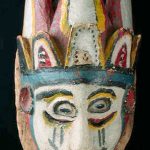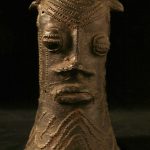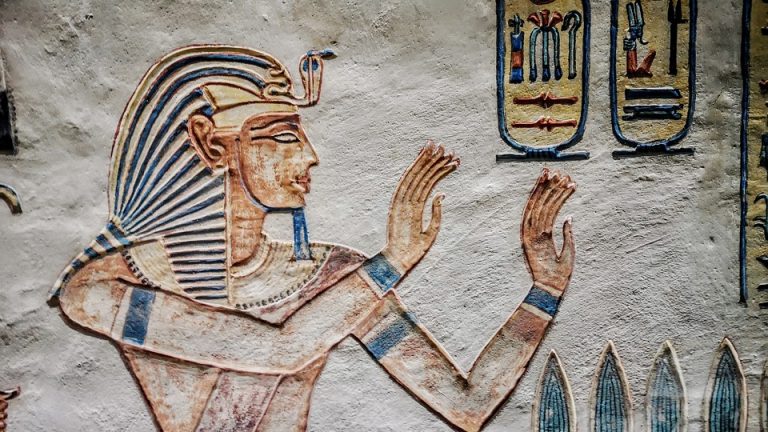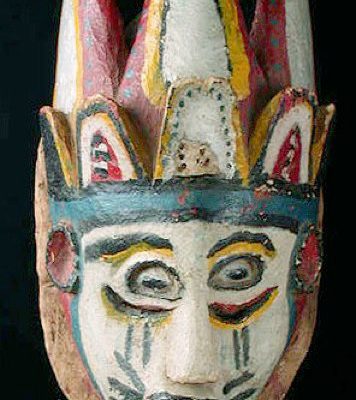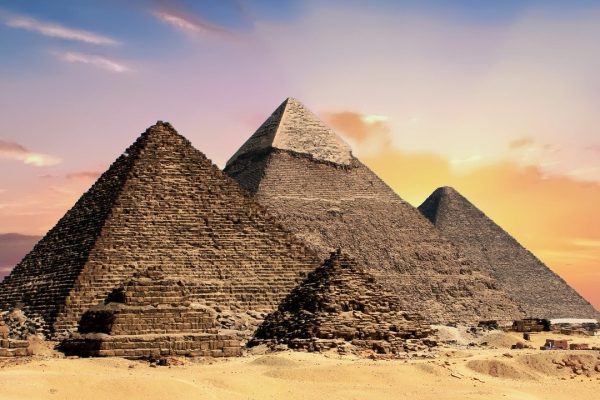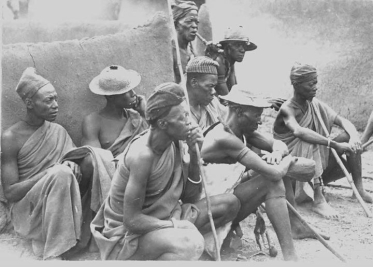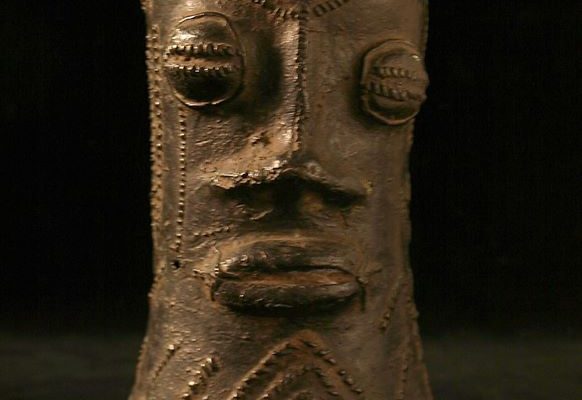- ORAL HISTORY
The quest for Igala origins gained momentum when European explorers, missionaries and colonial administrators variously carried out investigations about the Igala people; and informants fed them with stories based on oral accounts, as follows:
(a) Ígálámẹ̄la Clans
According to oral history, the first Igala to arrive the coastal town of Idah were now the Ígálámẹ̄la, the Igala aborigines whose clans form the Council of Kingmakers till date. An ascetic and knowledgeable Igala-Kwararafan royalist, Àbùdù Àámẹ́-Òbòní, claimed that the first arrivals were dropped by a spacecraft around the Ọ̀chẹ́chẹ́ River at Idah. However, it is important that further research is carried out to authenticate this claim.
(b) The Ọ́gálá Fairy Tale
The is an Igala legend, a man named Ọ́gáláà who set up a household and prayed to ‘Ọ́jọ́ ‘ (God) to swell the population of the place so that a community could answer and popularize his name. Over time, his settlement grew by leaps and bounds and its inhabitants were known as ‘Àbó Ọgáláà,‘ [Ọ́gálá’s people]. Later, the initial vowel, ‘Ọ́’ changed to ‘Í,’ to become ‘Ígáláà.’
(c) Jukun Origins
There are different oral claims that trace Igala roots to a number of peoples and places. For instance, one of the claims asserts that they came from Wùkari, in the land of the Jukun (or Àpá) people. The source cites the story of Àbùtù Ẹ̀jẹ̀, a Jukun noble who came to Idah where he became the Ata and died at Aamagede, leaving his descendants on the Ata’s throne at Idah till date. However, modern research has revealed that Àbùtù Ẹ̀jẹ̀ was, in actual fact, a bona fide Igala, a warrior and an administrator. According to Robert Arthur Sargent (1984), he was ‘the leader of the leopard community’ (the Igala group) in the medieval Kwararafan multi-ethnic confederacy at Bíèpì, where he contested against a Jukun rival, Àdì Àgbú Kènjọ, for the confederacy’s throne, for which he was ‘a legitimate contender’ but was short-changed. Read more about Àbùtù Ẹ̀jẹ̀ on this website as members of the Kwararafa empire; but, in terms of biological relations, they are two different peoples with unique speech patterns that are also visibly different.
(d) Benin Origins
Some early writers, like Jacob Egharevba, trace Igala roots to Benin (or Edo) across the River Niger. However, linguistically, like in the case of the Jukun, there is no iota of similarity between Igala and Bini, Ishan or other languages spoken in Ẹ̀̀dó Kingdom.
(e) Ata Aliyu Ọbaje
A former Ata of Igala, Aliyu Ọbaje, was quoted as tracing the roots of the Igala to a tribe called Galla in Ethiopia and Uganda and even Yemen, a country on the Arabian Peninsula, in the South East Asia on the Red Sea. The claim of Ethiopian descent cannot be waved aside without a full research undertaken to establish its truth or otherwise, considering the mention of Ethiopia, Queen Sheba, Eri and other African characters in different books of the Holy Bible. Google ‘Eri’ and you would be amazed at what it says about him.
2. RESEARCH-BASED TRADITIONS
(a) Àtá Erí
Catherine Acholonu International Research Centre, Abuja, Nigeria, following the Centre’s 21-year research, published a book titled: Eden in Sumer on the Niger: Origins of Arians Eriland, Hebrews, Moors and Vedic Indians (2012). The research, among other things, revealed that Ídúù Eri, the ‘putative ancestor of all the Kwa peoples of West Africa, including the Yoruba, Bini, Igbo, Idoma, Yalla, Igala, Edo and other smaller tribes and the ‘Ashanti and Akan and Ga of Ghana.’ It explained that Iduu Eri had five sons, including these three: Àgùlù Érí, who founded Àgùlérì; Àtá Érí, who founded the Igala nation and its Àtá kingship system and Ẹ̀dó Erí who founded the Edo/Benin Kingdom; that Iduu Eri was the same person called ‘Khem,’ who had founded Ancient Egypt. The research further lent credence to the account of Professor Gabriel Áúdù Oyìbó on Igala and Yoruba peoples rendered below.
(b) Common Ancestry of Igala, Yoruba and Itshekiri
There is a strong belief that the Igala shares common ancestral ties with the Yoruba of South-west and the Ìtshẹ̀kírì of Warri in Delta State, Nigeria. In a research to establish the countless similarities between the languages of the three peoples, Femi Akinkugbe (1976; 1978), concluded that they possessed a common ancestor, hence, their classification in the Yoruboid sub-group of the larger Kwa language family.
(c) Claim of Egyptian (Khemetic) Descent
Professor G. A. Oyibo, an Igala scholar of global repute based in the USA, believes that both the Igala and Yoruba were of the same family and that, a long time ago, Igala ancestors had told the story of their migration from Khem – the name by which Ancient Egypt was known at he time – into the present-day Nigeria. This account is corroborated by Professor Saburi Oladeni Biobaku (1918-2001), a foremost scholar and historian in the University of Lagos, Nigeria, who, in 1983, stated that, the two groups reached Idah, east of the River Niger, and the Igala group signaled their intention to go no further but remain there to practise their pastoralist occupation; while while the Yoruba continued to Ile-Ìfẹ̀, in Ọ̀́sun State. Oral history states that the two group separated in Ìfẹ̀ area, in Ọ̀málá Local Government area of Kogi State. The source also stated that the Yoruba group also rested in a small village in Bìraidù District, for a while after their separation from their Igala kindred in Ìfẹ̀ are

